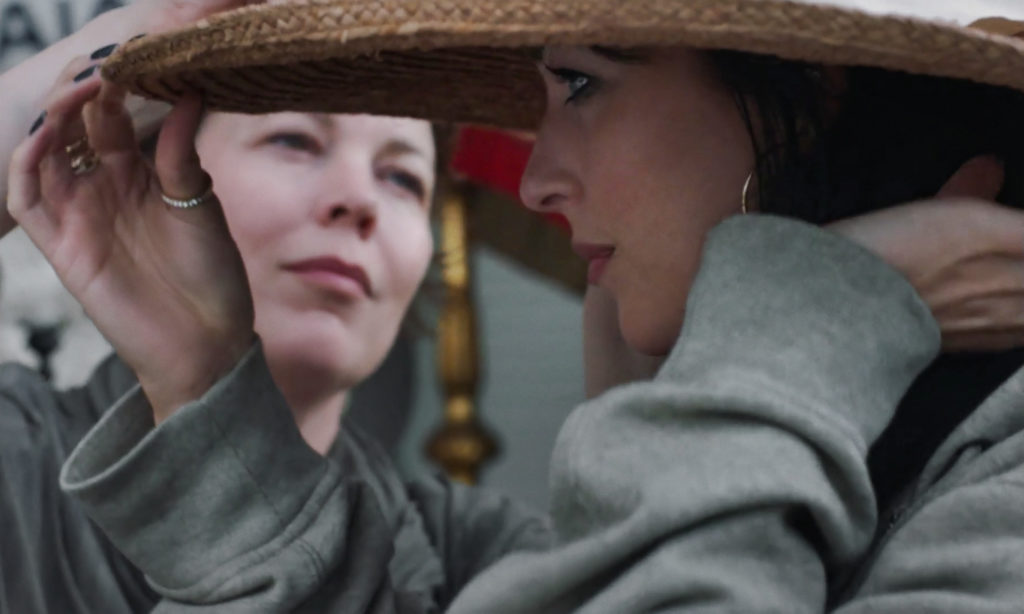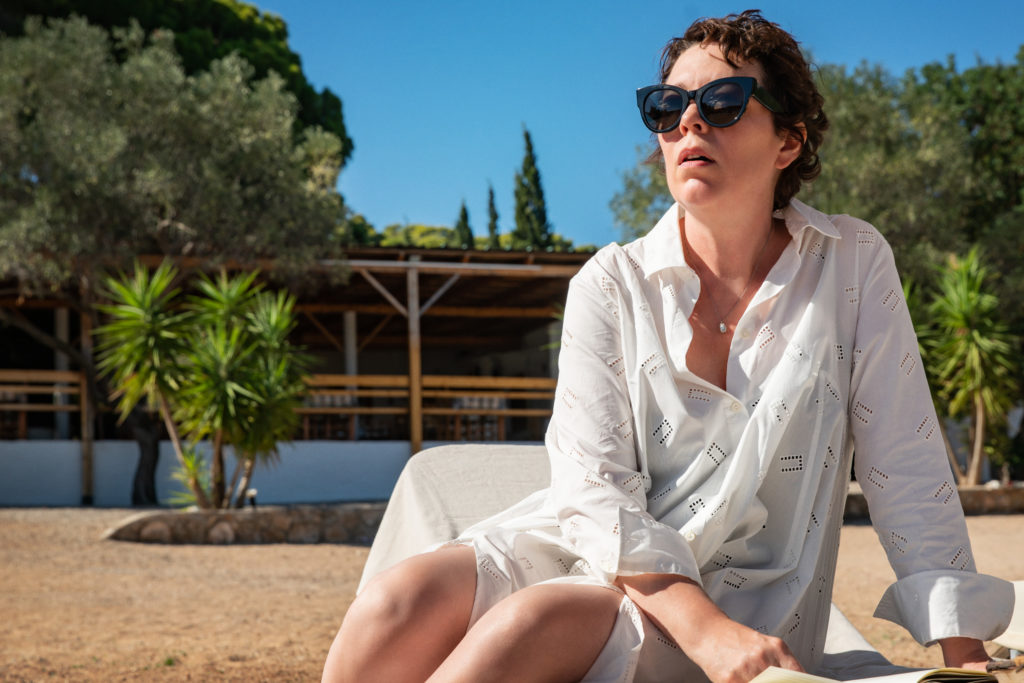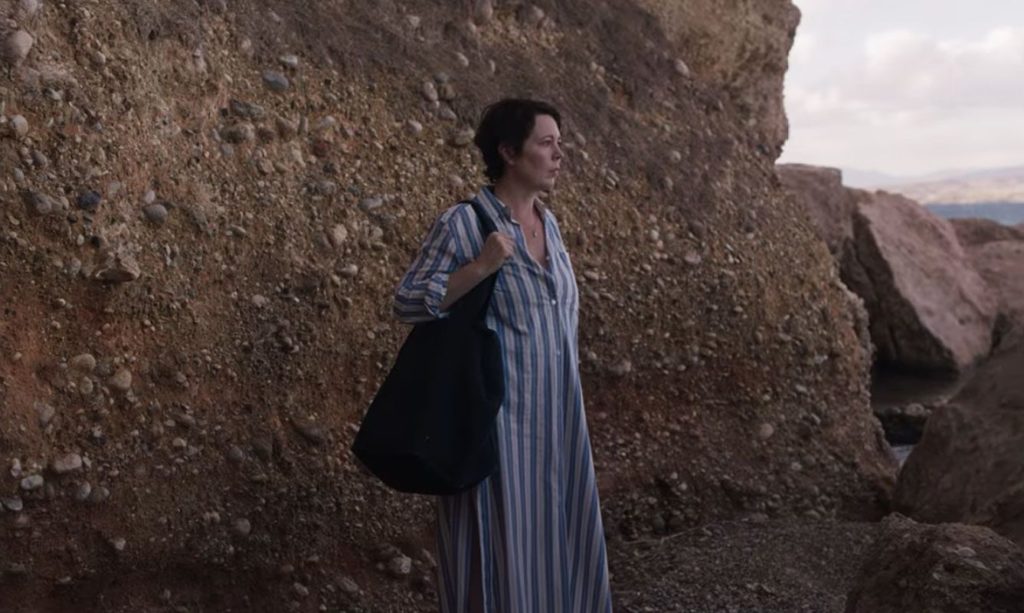Maggie Gyllenhaal’s directorial debut The Lost Daughter based on the novel by Elena Ferrante presents us with a fascinating problem. The main character, Leda, played by Olivia Colman, is unsympathetic. Leda’s a British woman on vacation in Greece, alone. She shares the beach with a raucous family from Queens; they disturb her solitude shouting and swearing. A member of the family asks for her beach umbrella and she selfishly refuses to relinquish it. She’s watching Nina (Dakota Johnson) part of the Queens crew and her toddler daughter. The little girl acts out, hitting, crying and pouring water on her sun-baked mother, who takes it. Leda’s flooded with memories of raising her two daughters, the joy and the annoyance, leaving them for stretches to work, making clear her frustration with them. Now a grown woman, those feelings of anger rise up and she acts out against Nina’s child. Gyllenhaal and Johnson spoke during an exclusive news conference in New York about facing our true, unvarnished selves, about being radically honest. What She Said’ Anne Brodie reports:


Maggie Gyllenhaal – Elena Ferrante’s books are really shockingly truthful. She tells the truth or just is honest about a lot of things that I think we have all agreed not to talk about. And, actually, also not even to think about. Instead of having that kind of electrifying experience, because if to be told the truth, I think, is inherently dramatic. Alone in my room, there was a time I dropped the book when I was reading it because I felt it was so shocking. Instead of having that experience alone in my room, and I knew I wasn’t alone since her books were flying off the shelves, I thought, “What if you could put those truths, these things that we’ve agreed not to talk about-she broke that agreement-what if you could break it again in a communal space like a movie theatre? What if instead of reading it, you could actually hear these things said out loud, you could actually see them, and maybe, sitting next to your mother, or your husband, or even your daughter, when these things were said out loud?” I thought that could be a really radical thing to try to do. You don’t know if you agree with everything Leda does. She does things that cause both herself and the people she loves a huge amount of pain, like an almost unbearable amount of pain. This isn’t advocating leaving your children, it is a movie that’s trying to talk about how we actually feel. There have been so many movies about women, many that are really interesting, really well-executed, that feel to me like they leave out the edges of the spectrum of my experience.

Dakota Johnson – There are a lot of things that we talked about that I’ll never say out loud. Absolutely not. What a gift to be able to like really be-really be open and like allow me to go to ugly places and ugly feelings and, you know, touch on parts of myself that are dark and to feel really safe in that and to know that in the edit, that Maggie was really going to hold it and take care of it and not discard moments where I was extremely vulnerable. She really loved me. I haven’t seen a woman or haven’t had the opportunity to play a part like Nina and it changed my life. It made me grow as a woman.


How was it working with Maggie, a female director making her debut?
So immensely different. It felt like I was really, as a woman, and as an artist, as a human being, seen and really loved and cared for. Maggie was genuinely interested in my ideas and my thoughts and was curious to see where I would go on my own, or how I would receive a certain note. I think I’ve become so used to feeling unsafe on a set and feeling so vulnerable, and everyone is watching, and that’s just how it goes. And not all the time do you have a director who really loves you, and likes you, and wants to know you. It was such a gift. I felt like I was able to reach into these really far corners of myself, and my artistry, and go into the darker places, which, are the truth, because I have all of it. The thing that this character made me feel is that it’s so okay to have complicated feelings around womanhood and motherhood, and that is what’s normal. You know, what I see in scripts a lot of the time, and what I see in films is a woman trying to-trying to, lie all the time about not being scared, or angry, or frustrated, or fucking pissed off, you know? I see young women written, and I’m always like, “Okay, I guess I have to try to fit into this thing.” And with Maggie and Nina, I felt like I could just open up, and that she would take care of what I was giving.

Maggie, what was your experience working with Olivia Colman as Leda?
She doesn’t wanna talk about it. She does want to rehearse. Our interaction together was always ‘under’ the words, the most important things that are happening are happening under the words. This was a case where I said, You know what? I just realized something. And when I shared it with her. This is the thing about all of my actors. Yes, okay, I’ll have this idea, I’ll see it this way, I’ll try, “Oh, go that way.” “Oh, what happens if we light this part of you on fire?” But then the way they react is, like, without exception, totally surprising and exciting at every moment.

Maggie how best can people experience The Lost Daughter?
If you’re going to try to follow it like, “Who done it and will they find out and…” I don’t think that’s interesting enough to hold you through the whole film. The way through is her mind. But then I think without even knowing that I was doing this when I look back on it now, I think I was trying to make space for my own expression, to find out what’s my language as a filmmaker.